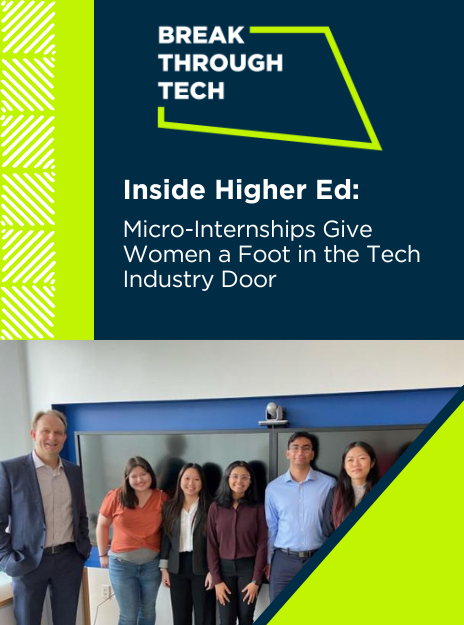
Break Through Tech’s Sprinternships offer women and minority groups short-term opportunities for professional experience in tech.
- Sprinternship Program
Break Through Tech’s Sprinternships offer women and minority groups short-term opportunities for professional experience in tech.
One organization is creating space at the tech industry’s table for undergraduates by providing short-term work experiences to equip them for summer internships and beyond.
Employment in science, technology, engineering and math has grown over the years, with about 24 percent of the U.S.’s workforce in STEM in 2021, but only 18 percent of the field at that time identified as women, according to the National Center for Science and Engineering Statistics.
Judy Spitz, a former Verizon chief information officer, wants to close that gap by helping college-age women receive paid summer internships.
Spitz founded Break Through Tech working with Cornell Tech as a partner. The organization’s Sprinternship program places students in short-term programs to gain hands-on tech experience in a workplace setting. The program has proven successful in giving project-based learning opportunities to over 1,000 women and getting the majority of them in that coveted next-step intern role.
A break in the cycle: Tech companies want to hire more diverse talent, and Sprinternships bridge the gap between employers and students.
“Companies don’t typically recruit from the kinds of schools that we were interested in working with, that have high diversity numbers,” Spitz says. Instead, employers focus on top-ranked schools or students with extensive experience in tech.
It was Break Through Tech’s goal to place women and minority students in internships, which meant partnering with companies to create space for their talent and finding a way to give the students enough experience to be prepared for a summer internship.
A short-term, full-time role in a company creates a relationship between the host company and the intern that often results in a longer summer internship, Spitz says.
Around 80 percent of Break Through Tech’s 500 annual Sprinterns receive offers for summer internships from their host company, and 64 percent receive internship offers from other companies.
The prototype: Sprinternships are three-week micro-internships between a diverse college or university with one of Break Through Tech’s 125 host employers, such as Verizon, American Express, LinkedIn and CVS Health. Currently, Break Through Tech has eight higher ed institution partners located in New York City, Chicago, Miami, Los Angeles, Boston and Washington, D.C.
The program is focused on women and nonbinary students, but men from underserved communities are also welcome to participate, Spitz says.
Students spend their winter break or a few weeks in May as part of a small group working through a “challenge problem” for their host under the supervision of a company adviser, Spitz explains.
The host organization creates the challenge for students, which is different from work for hire, Spitz says. Instead, the project should require innovative thinking, and students pitch their work at the end of their Sprinternship.
Each host determines the pay rate, but program participants make at least $15 per hour, Spitz says.
Outside the box: One unique factor in Sprinternships is the cohort environment. Each company takes a small group of students who work together under a mentor, which the companies say is easier than one-on-one attention.
“It was important to us that students worked in a group,” Spitz says. “The students lean on each other … and it mimics the real world—they’re working on a team.”
That team environment also gives students talking points when asked in future interviews about areas such as conflict resolution strategies and leadership approaches.
During the program, interns make connections across the companies, meeting engineers, product designers, finance people, lawyers and HR professionals, Spitz says.
“We want the students to ask questions like, ‘Who are your customers? How do you make money? What’s your business model?’ in addition to ‘How do I get hired into this company?’ and ‘What are you looking for on résumés?’” Spitz explains. “Our students don’t have a built-in way to get that kind of experience.”
Break Through Tech matches students directly with the host company, expediting the application process by eliminating the need for an interview on-site.
Tinkering with the tech: Break Through Tech launched its first Sprinternship in 2017 with five students from City University of New York, who worked at Verizon over their winter break. Every student was offered a summer internship. Since then, around 1,500 students have participated in Sprinternships.
Spitz and Break Through Tech have tightened operations to make it more of a “turnkey operation,” she says. The host company’s adviser spends around four to six weeks planning and is responsible for managing the project. Break Through Tech provides a library of project options, consulting support on challenge projects and establishes checkpoints throughout in addition to a post-internship survey for students and hosts.
Solving the problem: Since the program’s start, Spitz has already seen a “second generation” of sorts, when a former Sprintern was employed by her host company and, in turn, became a Sprinternship manager for a new cohort of interns.
Companies are also leaning into the Sprinternship model to source their future workforce. One company hosted 100 Sprinterns this past winter, with the goal of offering 50 percent of them a summer internship.
In the future, Spitz hopes to expand the program’s offerings in terms of location, partner organizations and institutions.
